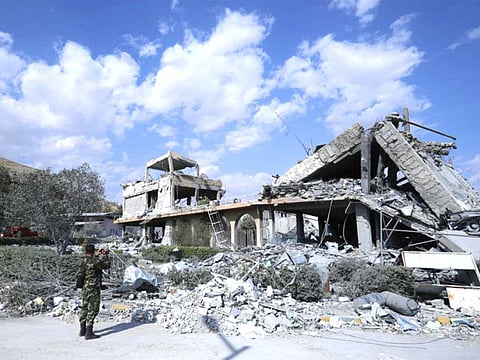‘Mission accomplished’ but to what end?
Russia and the US can fight over the moral high ground but the right thing would be to leave the Syrians to choose their own destiny

President Donald Trump would have been wise to have used a different turn of phrase to announce an end to US, UK and French strikes on three Syrian targets. ‘Mission accomplished’ evokes an image of George W. Bush on board a US aircraft carrier in May 2003 prematurely touting victory in Iraq.
The 110 missiles launched from ships and bombers did constitute a message to the Al Assad regime that Western allies are prepared to use military force to deter the use of chemical weapons in Syria.
However, if the mission was meant to give the Al Assad government and its backers a bloody nose, then it was just as ineffective as last year’s when 53 US Tomahawks struck a Syrian airfield that was up and running within days.
On this occasion there were no fatalities, thankfully so. In retrospect, the allies’ aircraft carriers, warships and nuclear submarines swarming off Syrian shores amounted to overkill. Only a few buildings, probably cleared-out in the run-up to the attack, were semi-demolished; a couple of wrecking balls and bulldozers would have done as well.
Nothing has changed in Syria. Videos shown on various networks, including the BBC, on Friday morning showed flag-waving Syrians in Damascus and Aleppo denouncing the US-led attacks while pledging support for their army. It was business as usual in the capital; the traffic and the fountains were flowing.
Bashar Al Assad appeared unfazed strolling into his office. He must have been relieved to get off so lightly. Both the British PM Theresa May and a Pentagon spokeswoman confirmed that regime change is not on the cards. The government is in the final stage of taking its territory back from opposition forces, militant groups and terrorists. Al Assad is going nowhere.
The fact is that none of the protagonists have any appetite for authorising a massive ground force to take on the regime and have no interest in nation building. The consensus is that the Trump administration has no strategy. So what was this costly theatre that could so easily have triggered a nuclear war all about?
My impression is that it was planned to put Vladimir Putin in his place, to prove to the world that the mighty US is not a spent force in the Middle East and to display the US president’s global muscle at a time when he is mired in domestic scandals. The Skripal poisoning rallied the allies and provided the impetus to punish Russia for its annexation of Crimea and its alleged cyber warfare and interference in the US election.
Trump’s anti-Russian rhetoric was more bellicose than any of his predecessors. But it seems that his hoped-for full-throttle offensive was watered-down on the advice of his Secretary of Defence Jim Mattis who this time did not live up to his “Mad Dog’ nickname.
Russia threatened military retaliation in the event of any Russian fatalities which greatly complicated the mission since Russian and Syrian military personnel are intermingled. The prospect of direct US-Russian military confrontation was heightened. Neither side was keen to be in the position of having to confront the other so it is likely that the allies’ eventual minimalist approach resulted from a face-saving deal.
On the question of Al Assad’s alleged crime in now liberated Douma, despite the western threesome all singing from the same hymn sheet I believe that was used as a pretext for the US-led trio’s muscle-flexing. All maintain they have evidence but none are willing to make it public citing classified intelligence.
Were they relying on videos which could indeed have been faked or on human intelligence which could only have been derived from members of Jaish Al Islam a coalition of Islamist militants euphemistically described as ‘rebels’.
Furthermore, if they were intent on getting incontrovertible proof there was no reason to block an UN-sponsored investigation of the alleged site in the UN Security Council. Notably, they chose to attack on the very morning when inspectors from the Organisation for the Prohibition of Chemical Weapons (OPCW) were due to start work at Russia’s invitation.
All parties to this seven-year-long conflict have blood on their hands. There are no good actors in Syria. Up to 700,000 Syrians have been killed and half the population displaced. Al Assad must go is a common refrain, but the question is this. If the state collapses who or what is capable of picking up the pieces? Lessons have been learned from Afghanistan, Iraq and Libya where chaos reigns.
Any sustainable solution must be hammered out by all the permanent members of the UN Security Council and should involve the exit of Iran, Hezbollah and Turkey prior to a political road map to bring about free and fair elections. Russia should use its leverage with Tehran and its proxies to get them packing. Neither Israel nor Saudi Arabia can tolerate an Iranian-dominated Syria on their doorstep permitting a corridor from Tehran to the Mediterranean.
There are too many cooks in this kitchen and too many competing interests. Trump’s instincts were right from day one when he was eager to work with Putin on global problems. Together they could have made a real difference.
Syrians desperate to go home and resume their lives, have been forgotten in this Cold War Mark II power struggle. Russia and the US can fight over the moral high ground but the right thing to do would be to leave the Syrians alone to choose their own destiny.
Linda S. Heard is an award-winning British political columnist and guest television commentator with a focus on the Middle East.


